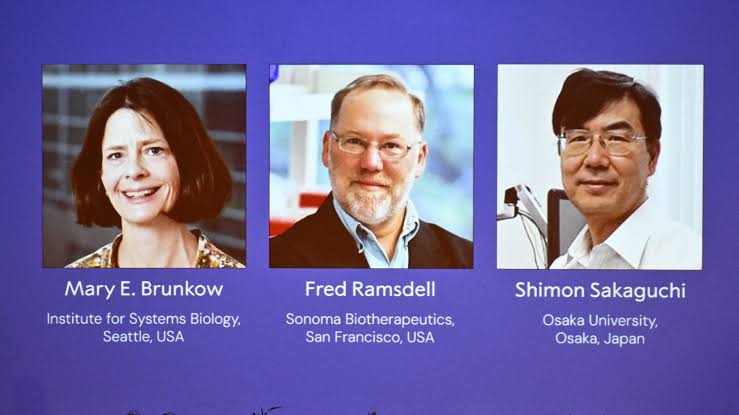Int'l Correspondent
Published:2025-10-06 19:20:20 BdST
US-Japanese trio win medicine Nobel for immune system research
Gghh
Mary E. Brunkow and Fred Ramsdell of the United States and Japan's Shimon Sakaguchi won the Nobel Prize in Medicine on Monday for research into how the immune system is kept in check, the Nobel jury said.
Their discoveries have been decisive for understanding how the immune system functions and why we do not all develop serious autoimmune diseases.
The three were honoured "for their discoveries concerning peripheral immune tolerance", the jury said.
"Their discoveries have laid the foundation for a new field of research and spurred the development of new treatments, for example for cancer and autoimmune diseases," it added.
Their findings may also lead to more successful transplantations.
Sakaguchi, 74, made the first key discovery in 1995.
At the time, many researchers were convinced that immune tolerance only developed due to potentially harmful immune cells being eliminated in the thymus, through a process called "central tolerance".
Sakaguchi showed that the immune system is more complex and discovered a previously unknown class of immune cells, which protect the body from autoimmune diseases.
Brunkow, born in 1961, and Ramsdell, 64, made the other key discovery in 2001, when they were able to explain why certain mice were particularly vulnerable to autoimmune diseases.
"They had discovered that mice have a mutation in a gene that they named Foxp3," the jury said.
"They also showed that mutations in the human equivalent of this gene cause a serious autoimmune disease, IPEX."
Two years later, Sakaguchi was able to link these discoveries.
The trio will receive their prize -- a diploma, a gold medal and a $1.2-million cheque -- from King Carl XVI Gustaf at a formal ceremony in Stockholm on December 10, the anniversary of the death in 1896 of scientist Alfred Nobel.
Nobel created the prizes in his last will and testament.
- Trump jeopardising US leading role -
Researchers from major US institutions typically dominate the Nobel science prizes, due largely to the US' longstanding investment in basic science and academic freedoms.
But that could change down the line following massive US budget cuts to science programmes announced by President Donald Trump.
Since January, the US National Institutes of Health (NIH) has terminated 2,100 research grants totalling around $9.5 billion and $2.6 billion in contracts, according to an independent database called Grant Watch.
Thomas Perlmann, secretary general of the committee that awards the Nobel Prize for Medicine, told AFP it was "no coincidence that the US has by far the most Nobel laureates".
"But there is now a creeping sense of uncertainty about the US' willingness to maintain their leading position in research," he said.
Perlmann called the United States "the very engine" of scientific research worldwide.
"There would be very serious consequences for research globally if it starts to falter," he added.
"It doesn't take very many years of large cutbacks to cause irreversible harm."
Trump has meanwhile made no secret of the fact that he wants to win a Nobel himself -- the Peace Prize.
Nobel experts have however said his "America First" policies and divisive style give him little chance against those toiling on forgotten causes outside the limelight.
"It's completely unthinkable," Oeivind Stenersen, a historian who has conducted research and co-written a book on the prize, told AFP.
"(Trump) is in many ways the opposite of the ideals that the Nobel Prize represents," he said.
"The Nobel Peace Prize is about defending multilateral cooperation, for example in the UN... and Trump breaks with that principle. He follows his own path, unilaterally," Stenersen added.
Sudan's Emergency Response Rooms (ERR) -- networks of volunteers feeding and helping people endure war and famine -- are seen as a possible winner this year, as are media watchdogs the Committee to Protect Journalists and Reporters Without Borders.
Yulia Navalnaya, the widow of Kremlin critic Alexei Navalny, is among bookies' favourites.
The Nobel season continues this week with the announcement of the winners of the physics prize on Tuesday, chemistry on Wednesday, literature on Thursday, peace on Friday and economics on Monday, October 13.
Unauthorized use or reproduction of The Finance Today content for commercial purposes is strictly prohibited.


